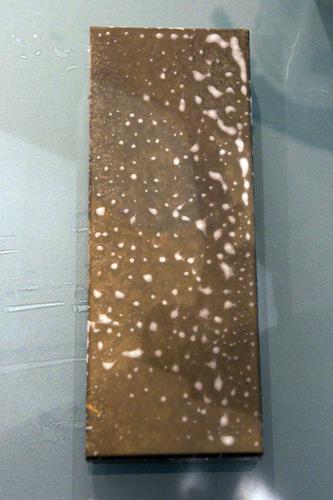Results 11 to 20 of 48
-
10-09-2011, 03:06 PM #11

FWIW, Soap is a bad thing on a Japanese Natural. I've seen guys use soap on eveything here from their face to stones, to strops. I use a very minimal amount of water on my J nats. I have a few Nakayama Maruichi and Maruka Asagi's that tent to stick, but are great finishers. I find using a very thin slurry does the trick.
We have assumed control !
-
10-09-2011, 03:08 PM #12
-
10-09-2011, 03:12 PM #13

Is the stickiness at all related to drag?
I only ever experience stickiness with kamisori, but a subtle draw does change throughout the honing, usually increasing as I finish.
-
10-09-2011, 03:21 PM #14

As previously mentioned by Jim, they're porous, meaning soap will absorb into the body of the stone, that's bad. It has the ability to break down the binders in the stones, like Shapton's and Chosera's, as far as I know. I was also told to use minimal amounts of water by an old J nat expert on this forum some time ago. His name was Old School. He sold high quality stones at affordable prices. It was a shame to see him go. Stones like the Coticule are non porous, so you can use oil, water, lather, grape jam, whatever you want. That's Jam, not jelly, it makes a difference when abrading steel.
Just like the Shapton GS, they say in the instructions not to use soap.Last edited by zib; 10-10-2011 at 08:02 PM.
We have assumed control !
-
10-09-2011, 04:28 PM #15Indisposed

- Join Date
- Oct 2008
- Posts
- 6,038
Thanked: 1195
-
10-09-2011, 07:58 PM #16

Do you have a dog?
I have experimented a lot with many coticules, lubricants, buffers and the like. Feel free to PM me as I hate coticule discussions.
Actually the most difficult to remove is wax.
Thanks Jim and Rich for confirming the incompatibility of the binders with soap.
-
10-10-2011, 07:45 AM #17

Brighty, I've never heard of using soap on Jnats but washing soda (Sodium carbonate) is commonly mixed in the water by Japanese sword polishers to prevent rust. It makes the water "slippery" if that's what you want. Just don't use it on Shaptons etc.
The white gleam of swords, not the black ink of books, clears doubts and uncertainties and bleak outlooks.
-
10-10-2011, 08:58 AM #18

Just tried another blade tonight, finishing with a lather and i got the same results, mirror finish on the bevel and spine and the shave of this blade was one of my best shaves ever!
I still need to test a few more blades but if i keep getting results like this I might keep going with this stone with lather and see how it holds together for 12 months.. This could be my new finishing stone!
Last edited by Brighty83; 10-10-2011 at 09:10 AM.
-
10-10-2011, 09:36 AM #19

Thanks Oz,
I have heard its not good for synthetics so I wont use it on my synthetics ( unless it a barbers hone ). It does make sense that synthetic hones could be damaged by soaps as they are held together by resins and\or glues etc, natural stone are held together by stone itself thus should be less of a risk with corrosive agents.
). It does make sense that synthetic hones could be damaged by soaps as they are held together by resins and\or glues etc, natural stone are held together by stone itself thus should be less of a risk with corrosive agents.
It sounds like they were trying to achieve the same results if they used to use sodium carbonate, I would have thought i basic lather soap would be less corrosive then sodium carbonate, since sodium carbonate is a salt.
Isn't the whole "dont get your jnats too wet" to do with the stone cracking not dissolving? I though it was to do with the natural lines through the stone and expansion with the water causing it to crack, i know max has soaked jnats with no issue but i'm guessing they don't have any line or faults in the stone.

Last edited by Brighty83; 10-10-2011 at 10:04 AM.
-
10-10-2011, 07:18 PM #20

I think cracking has to do w/ drying out in the sun or letting water in the stone freeze, & soaking is supposed to lead to dissolving in the softer stones. The stones Max has soaked IIRC have been the super hard ones. Those are dense enough to take it.
Another reason for going easy on the water has to do w/ honing itself--some stones do not give their best results when you use too much--mine wipes away the edge if I use too much water or slurry. It chatters & skips & the edge is back to sub-4k territory in a hurry whereas very little water/slurry makes Shavette-killer edges!


 16Likes
16Likes LinkBack URL
LinkBack URL About LinkBacks
About LinkBacks







 Reply With Quote
Reply With Quote


